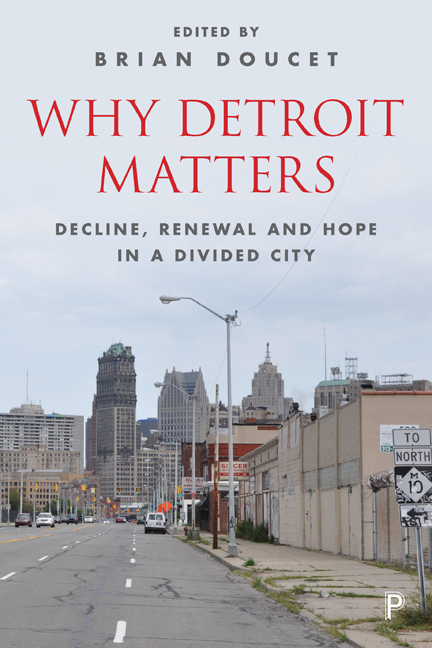Book contents
- Frontmatter
- Contents
- List of contributors
- List of figures and tables
- Acknowledgments
- one Introduction: why Detroit matters
- Section One Lessons from Detroit
- Intermezzo I You may not know my Detroit
- Section Two Practices from Detroit
- Intermezzo II My Detroit
- Section Three Conversations from Detroit
- References
- Index
ten - Detroit’s emerging innovation in urban infrastructure: how liabilities become assets for energy, water, industry, and informatics
Published online by Cambridge University Press: 05 April 2022
- Frontmatter
- Contents
- List of contributors
- List of figures and tables
- Acknowledgments
- one Introduction: why Detroit matters
- Section One Lessons from Detroit
- Intermezzo I You may not know my Detroit
- Section Two Practices from Detroit
- Intermezzo II My Detroit
- Section Three Conversations from Detroit
- References
- Index
Summary
Detroit has many aspects that, all too often, are conceived of as liabilities. These include vast amounts of vacant land, empty and abandoned buildings, and undervalued property. Dan Kinkead sees these characteristics not as liabilities, but rather as assets for leveraging new and innovative urban practices. His chapter focuses on innovative infrastructure, such as renewable energy production or industrial adaptive reuse. In it, he provides specific examples of where a variety of stakeholders are coming together on specific projects that form part of holistic approaches to a multitude of challenges. The examples presented in this chapter are varied and involve both changing practices in specific sites throughout the city and new techniques of data gathering and mapping that are helping to both better understand the city and meet some of the challenges that it is facing, including the threat from speculators mentioned in Chapter Five by Joshua Akers.
Dan Kinkead is an architect and urban designer. He is a principal for urban design at the national design firm SmithGroupJJR, and visiting architect in residence at the Cranbrook Academy of Art. Before his current role, Dan was the Founding Director and Director of Projects for the Detroit Future City Implementation Office. Dan's career has included a design principal role at Detroit-based Hamilton Anderson Associates, and an urban design role at Skidmore Owings & Merrill, LLP, in New York. He graduated from Harvard University with a master of architecture in urban design, with distinction, and from the University of Kentucky with a bachelor of architecture. Kinkead's work has been published in domestic and international design media, including a recent contribution to Remaking Post-industrial Cities: Lessons from North America and Europe, edited by Don Carter (Routledge, 2016).
Introduction
Detroit is often defined by emotive and consumable illustrations of its struggles. The physical manifestations of its historic depopulation and disinvestment are equally startling. With a 60% decline in peak population, over 23.4 square miles of accumulated vacant land, and its recent emergence from the largest municipal bankruptcy in US history, Detroit is broadly recognized for the negative characteristics of global economics, and socio-political distress (United States Census Bureau, 2010; Motor City Mapping, 2014; see also Galster, Chapter Two). Yet, more recent assertions, including the Detroit Future City (2013) Strategic Framework Plan—a comprehensive recovery tool launched in 2013—are beginning to articulate a new future for the city.
- Type
- Chapter
- Information
- Why Detroit MattersDecline, Renewal and Hope in a Divided City, pp. 195 - 208Publisher: Bristol University PressPrint publication year: 2017



